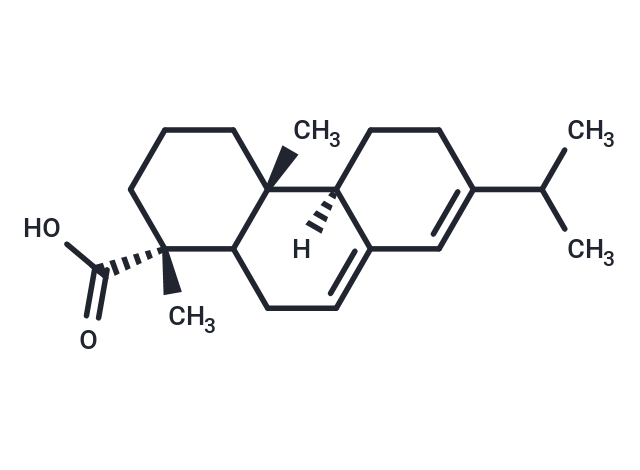Shopping Cart
- Remove All
 Your shopping cart is currently empty
Your shopping cart is currently empty

Abietic Acid (Sylvic acid) is a diterpene extracted from Pimenta racemosavar. grissea with antimicrobial, antiproliferative and anti-obesity activities. It inhibits lipoxygenase activity and may be studied in allergic diseases.

| Pack Size | Price | Availability | Quantity |
|---|---|---|---|
| 10 mg | $45 | In Stock | |
| 25 mg | $68 | In Stock | |
| 50 mg | $98 | In Stock | |
| 100 mg | $146 | In Stock | |
| 500 mg | $358 | In Stock | |
| 1 mL x 10 mM (in DMSO) | $44 | In Stock |
| Description | Abietic Acid (Sylvic acid) is a diterpene extracted from Pimenta racemosavar. grissea with antimicrobial, antiproliferative and anti-obesity activities. It inhibits lipoxygenase activity and may be studied in allergic diseases. |
| Targets&IC50 | 5-LOX:29.5 μM |
| In vitro | METHODS: Different concentrations of Abietic Acid (Sylvic acid) (20, 40, 80, 160 and 320 µmol/l) were added to the cell culture medium of RAW264.7 cells and then incubation was continued for 26 hours. In order for Abietic Acid (Sylvic acid) treatment to have an effect on inflammatory mediator secretion, different concentrations of Abietic Acid (Sylvic acid) (20, 40 and 80 µmol/l) were added to the cell culture medium of RAW264.7 cells and incubated for 2 h. Then 1 µg/ml LPS was added to the cell culture medium of RAW264.7 cells and incubation was continued for 24 h. The cell culture medium of RAW264.7 cells was then incubated for 2 h. The cell culture medium of RAW264.7 cells was then incubated for 24 h. RESULTS Low concentrations (20, 40 and 80 µmol/l) of Abietic Acid (Sylvic acid) did not affect the viability of RAW264.7 cells, while high concentrations (160 and 320 µmol/l) of Abietic Acid (Sylvic acid) decreased the viability of RAW264.7 cells. Low concentrations of Abietic Acid (Sylvic acid) significantly reduced the concentrations of IL-1β, TNF-α, IL-6 and MIP-2 induced by LPS in the cell culture medium of RAW264.7 cells. [2] |
| In vivo | METHODS: Swiss mice (Mus musculus) were treated orally in 50, 100, and 200 mg/kg of Abietic Acid (Sylvic acid) central nervous system (CNS) effects were assessed using open-field and rotational assays, and anti-oedema activity was investigated by measuring carrageenan, dextran, histamine, arachidonic acid, and prostaglandin-induced paw edema. RESULTS Oral administration of Abietic Acid (Sylvic acid) (200 mg/kg) showed no evidence of CNS effects, and the compound also exhibited significant anti-edema and anti-inflammatory activity in carrageenan and dextrose models. [1] |
| Alias | Sylvic acid, Rosin Acid, L-Abietic acid |
| Molecular Weight | 302.45 |
| Formula | C20H30O2 |
| Cas No. | 514-10-3 |
| Smiles | [H][C@]12CCC(=CC1=CCC1[C@@](C)(CCC[C@]21C)C(O)=O)C(C)C |
| Relative Density. | 1.06g/cm3 |
| Storage | store at low temperature | Powder: -20°C for 3 years | In solvent: -80°C for 1 year | Shipping with blue ice. | |||||||||||||||||||||||||||||||||||
| Solubility Information | DMSO: 60 mg/mL (198.38 mM), Sonication is recommended. | |||||||||||||||||||||||||||||||||||
Solution Preparation Table | ||||||||||||||||||||||||||||||||||||
DMSO
| ||||||||||||||||||||||||||||||||||||

Copyright © 2015-2025 TargetMol Chemicals Inc. All Rights Reserved.